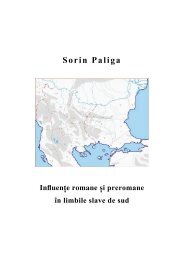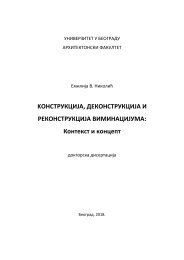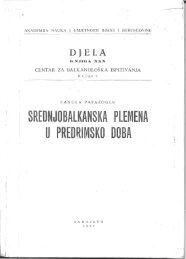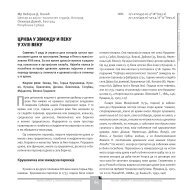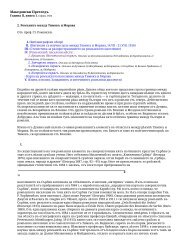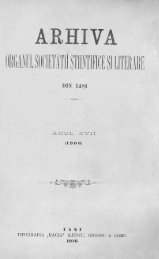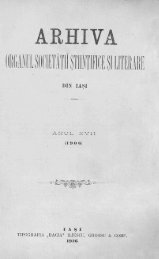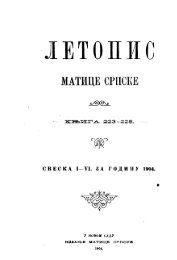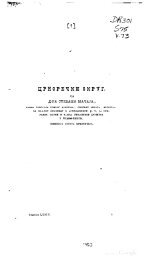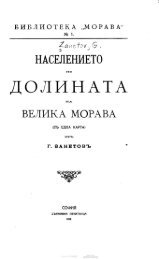The Construction of National Identity and its Challenges in Post-Yugoslav Censuses
Create successful ePaper yourself
Turn your PDF publications into a flip-book with our unique Google optimized e-Paper software.
892 Social Science Quarterly<br />
curiosity, or just as a joke. Altogether these choices had limited resonance, with 40 Jedi 7<br />
<strong>in</strong> Montenegro (B92, 2011), 303 <strong>in</strong> Croatia (Slobodna Dalmacija, 2012), some 640 Jedi<br />
<strong>in</strong> Serbia (Na Dlanu, 2012). Other common ironic categories <strong>in</strong>clude “aliens,” “smurfs,”<br />
or “Martians,” which some 268 choose <strong>in</strong> Serbia (Kurir, 2012). Croatian media similarly<br />
reported <strong>of</strong> 154 “Cosmopolitans,” some call<strong>in</strong>g themselves just “humans,” “Kl<strong>in</strong>gons,”<br />
“<strong>in</strong>ternationals,” or “<strong>in</strong> love” (Slobodna Dalmacija, 2012). Altogether, <strong>in</strong>dividuals choos<strong>in</strong>g<br />
these categories do not amount to more than a few hundred <strong>in</strong> each <strong>of</strong> the post-<strong>Yugoslav</strong><br />
countries. This type <strong>of</strong> response has some tradition <strong>in</strong> <strong>Yugoslav</strong>ia. In the last <strong>Yugoslav</strong><br />
census <strong>in</strong> 1991, some citizens <strong>in</strong> Bosnia identified as “Eskimos” to reject the dom<strong>in</strong>ant<br />
ethno-national discourse (Touquet <strong>and</strong> Vermeersch, 2008:280). As the video spot described<br />
at the beg<strong>in</strong>n<strong>in</strong>g <strong>of</strong> this article highlights, these choices should not be seen merely as a<br />
prank, but also as a form <strong>of</strong> protest <strong>and</strong> resistance (Cusack, 2010:3–4).<br />
However, other choices are more significant <strong>in</strong> terms <strong>of</strong> numbers <strong>in</strong> the post-<strong>Yugoslav</strong><br />
censuses. Namely, <strong>in</strong>dividuals can choose identity constellations that do not mock the<br />
<strong>of</strong>ficial classifications, but that run counter the “desired” categories <strong>of</strong> either the state or<br />
dom<strong>in</strong>ant identity groups <strong>and</strong> their political representatives. Such a choice might be the<br />
consequence <strong>of</strong> a person’s biography that does not fit <strong>in</strong>to the dom<strong>in</strong>ant ethno-national<br />
matrix (i.e., parentage from different national background), or based on a personal identity<br />
choice. This self-def<strong>in</strong>ition can reflect <strong>its</strong>elf by opt<strong>in</strong>g out <strong>of</strong> the dom<strong>in</strong>ant categories (i.e.,<br />
by identify<strong>in</strong>g as “Bosnian” rather than “Bosniak,” “Serb,” or “Croat” <strong>in</strong> the Bosnian<br />
census) (Markowitz, 2007).<br />
Another possibility is to not follow the aforementioned logic <strong>of</strong> congruence between<br />
national, l<strong>in</strong>guistic, <strong>and</strong> religious identity. For example, a self-identified Montenegr<strong>in</strong><br />
might <strong>in</strong>dicate Serbian as mother tongue, <strong>and</strong> atheism as religion, <strong>in</strong>stead <strong>of</strong> Montenegr<strong>in</strong><br />
language <strong>and</strong> Orthodoxy. Due to the l<strong>in</strong>kage between national identity, religion, <strong>and</strong><br />
language, both suggested by the census forms <strong>and</strong> the campaigns, such a choice clearly<br />
subverts the dom<strong>in</strong>ant ethno-national discourse. It is important to note that such choices<br />
do not just oppose state categories <strong>and</strong> the suggested l<strong>in</strong>kages between nation, language,<br />
<strong>and</strong> religion, but also the census campaigns led by different ethno-nationalist <strong>and</strong> religious<br />
communities that seek to establish the hegemony <strong>of</strong> a particular <strong>in</strong>terpretation <strong>of</strong> identity.<br />
Our analysis <strong>of</strong> the available census results thus focuses on the citizens who <strong>in</strong> one <strong>of</strong><br />
the manners above sought to opt out <strong>of</strong> the “suggested” identity categories <strong>and</strong> choose<br />
alternative identities or identity comb<strong>in</strong>ations.<br />
Regional Identities<br />
Regional identities generally act as a supplement to, rather than a replacement for,<br />
national identities. In the post-<strong>Yugoslav</strong> space, only two regional identities have been able<br />
to articulate a political <strong>and</strong> transnational dimension, namely, <strong>in</strong> Istria <strong>and</strong> Vojvod<strong>in</strong>a. <strong>The</strong><br />
number <strong>of</strong> citizens opt<strong>in</strong>g for regional identities as national identity is, generally speak<strong>in</strong>g,<br />
low. In Croatia, 0.64 percent <strong>of</strong> the population identified with a region as national identity.<br />
<strong>The</strong> overwhelm<strong>in</strong>g majority <strong>of</strong> these 27,225 citizens chose Istrian identity (92.6 percent).<br />
<strong>The</strong> share <strong>of</strong> citizens with a regional identity <strong>in</strong> Serbia is somewhat lower (0.43 percent)<br />
<strong>and</strong>, aga<strong>in</strong>, 92.8 percent <strong>of</strong> them hail from Vojvod<strong>in</strong>a (see Table 2). Consider<strong>in</strong>g the low<br />
levels <strong>of</strong> regional identity <strong>in</strong> Montenegro <strong>and</strong> Kosovo, we can note that regional identity is<br />
overwhelm<strong>in</strong>gly l<strong>in</strong>ked to two regions that have been able to constitute a relevant category <strong>in</strong><br />
7 Data from the Statistic Office <strong>of</strong> Montenegro.






